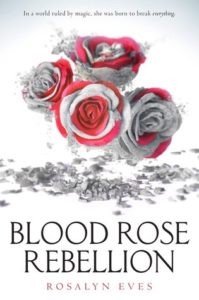 Author: Rosalyn Eves
Author: Rosalyn Eves
Title: Blood Rose Rebellion
Blood Rose Rebellion series #1
Knopf Books for Young Readers, 2017
Young adult fantasy novel
Reviewed by Michael Austin, Dec. 9, 2018.
Who can say, when you give a creature freedom, what he or she will choose? What will your world look like when you give all individuals the same rights? Can you say with certainty each person will use that power for good?
In 1773, just three years before the rebellion of the American colonies, the British Parliament under King George III passed the Enclosure Act, the first of many laws that took land that had once been held in common and gave it to aristocrats and large landowners to farm. It was an important moment in history, as it signified the end of the “Commons,” or of land that did not technically belong to anybody and could, therefore, be used by everybody.
The Enclosure Act is just one very prominent example of a dynamic that has, unfortunately, driven much of human history: powerful people privatize a common resource and create a narrative that justifies restricting that resource. Invariably, this narrative includes the argument that some people are entitled to exclusive use of the resource by the laws of nature.
This is how the world ends up with things like access to education restricted to people in a particular class, access to freedom restricted to people in a particular race, and access to religious authority restricted to people of a certain gender. Those who argue for these restrictions have created a culture of exclusion and then given that culture the ironic name of “nature.”
This is the idea at the center of Rosalyn Eves’ wonderful young adult fantasy novel Blood Rose Rebellion. In this novel, the resource in question is magic, because that is what one expects to find in a fantasy novel. And Blood Rose Rebellion has all of the things that one might expect to find in the sort of book that it is: magical powers, sinister plots, unimaginable horrors, and a young person uniquely qualified to upend the world and, in the process, save it. Or maybe destroy it.
But beneath these standard genre markers lurks a real novel of ideas. The magic of the world is tightly controlled by a hereditary aristocracy that has cast a super spell called “the binding” that restricts the common resource for their own use. In a different kind of book, though, and with only a very few alterations, though, “magic” could be replaced by “money,” “education,” “political power,” or “priesthood.” Eves has fastened onto a universal human problem, and she makes sure that she doesn’t turn it into a cliche.
The cliche, of course, would be that the evil aristocrats (or Luminati, as they are called in the book) try to prevent the chosen heroine from breaking the spell, but she persists, with the help of her friends, and saves the world. But this is too easy. Revolutions don’t work that way. Even if their cause is just, revolutions unleash powerful forces (let’s call them “monsters”) that societies have a hard time controlling. People get hurt. People die. There are guillotines.
And Blood Rose Rebellion is a novel about revolution set in an era of revolutions. It takes place in England and Hungary during 1847-48, the time of the actual Hungarian Revolution against the Actual Austrian Empire in which a lot of actually messy things happened. Eves uses history as far as possible to tell her story–but when it departs from the historical record (as tales of magic and monsters must), it holds on to the contradictory ideas that drove that, and every other revolution in human history.
And it is well written. My is it well written. Ms. Eves is a scholar and a thinker, but she is also a writer, and her gorgeous prose makes the whole book a feast. I am not, technically, a young adult, though I have raised two of them and read hundreds of YA books to them while they were still willing to let me in their rooms. I picked up Blood Rose Rebellion because I have had positive experiences with the author in other forums and was interested in reading more of her work.
I finished it, though, and will look forward to reading its sequels, because it is a sophisticated and gorgeously written novel about important ideas, packaged in a way that allows young adults, and anybody else who picks it up, to think deep thoughts and learn important things.
